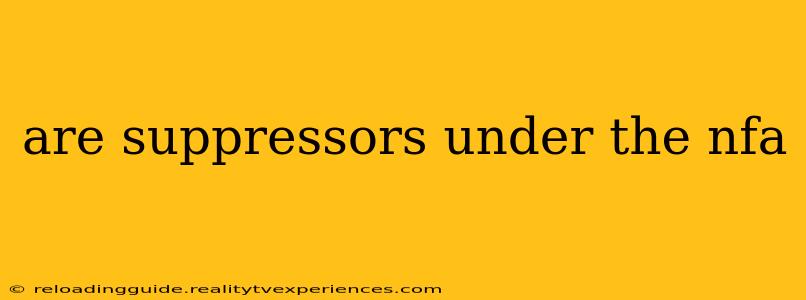The short answer is yes, suppressors, often mistakenly called silencers, are regulated under the National Firearms Act (NFA) of 1934. This means their ownership and use are subject to strict federal laws and regulations. Understanding these laws is crucial for anyone considering owning a suppressor. This guide will delve into the specifics of NFA regulations concerning suppressors, clarifying common misconceptions and providing essential information for responsible firearm ownership.
What is the National Firearms Act (NFA)?
The NFA is a United States federal law that regulates certain types of firearms and firearm accessories deemed particularly dangerous. These include:
- Suppressors (silencers): Devices designed to reduce the sound of a firearm.
- Machine guns: Automatic weapons capable of firing multiple rounds with a single trigger pull.
- Short-barreled rifles (SBRs): Rifles with barrels shorter than a specified length.
- Short-barreled shotguns (SBSs): Shotguns with barrels shorter than a specified length.
- Destructive devices: Explosives and certain other weapons capable of causing significant damage.
The NFA's primary goal is to control the access and use of these potentially hazardous items, aiming to enhance public safety.
The NFA and Suppressor Ownership: Key Requirements
Owning a suppressor legally requires navigating a complex process involving several steps:
1. Bureau of Alcohol, Tobacco, Firearms and Explosives (ATF) Registration:
This is the most significant hurdle. You must apply to the ATF for permission to own a suppressor. This involves completing Form 4, providing fingerprints, photographs, and undergoing a thorough background check. The process can take several months, and the approval is not guaranteed.
2. Tax Stamp:
Upon ATF approval, you'll be required to pay a significant tax, currently $200, for the registration of each suppressor. This tax stamp serves as official documentation of your legal ownership.
3. Compliance with State and Local Laws:
While federal law governs the NFA items, individual states may also have additional regulations regarding suppressor ownership and use. It is crucial to familiarize yourself with your state's and local municipality's laws before purchasing a suppressor. Some states may have outright bans, while others may have stricter permitting processes.
Common Misconceptions About Suppressors
- "Suppressors make firearms silent." This is a significant misunderstanding. While suppressors reduce the sound of a firearm, they do not make it completely silent. They reduce the noise level, making it significantly quieter but still audible.
- "Suppressors are only for criminals." This is a harmful stereotype. Many law-abiding citizens own suppressors for various reasons, including hearing protection, hunting, and competitive shooting.
- "The NFA process is quick and easy." This is false. The ATF registration process is lengthy and requires patience and meticulous attention to detail. Expect delays and thorough scrutiny of your application.
Responsible Suppressor Ownership
Owning a suppressor carries significant legal responsibilities. Always ensure you are fully compliant with all applicable federal, state, and local laws. Before initiating the purchase and registration process, consult with an attorney specializing in firearms law to ensure you understand the regulations and potential liabilities. Ignorance of the law is not a valid excuse for non-compliance.
Conclusion
Suppressors are undeniably under the jurisdiction of the NFA. Owning one requires navigating a rigorous and time-consuming legal process. Responsible ownership demands thorough understanding of the regulations, meticulous compliance, and a commitment to safe firearm handling practices. Remember to always prioritize safety and legality in all firearm-related activities.

